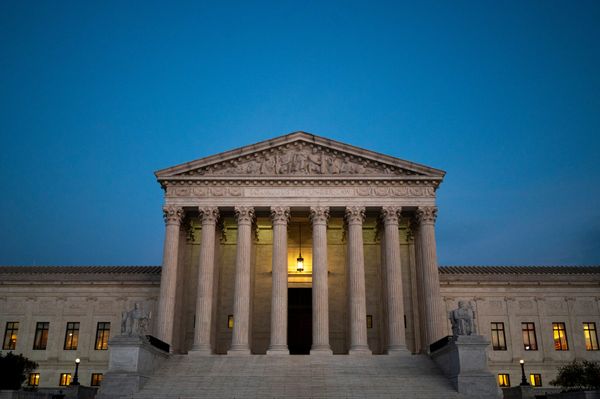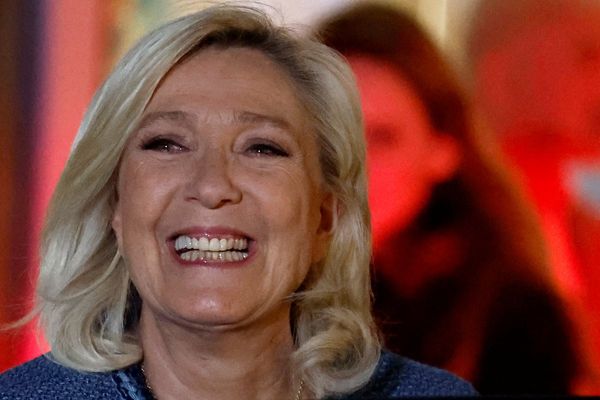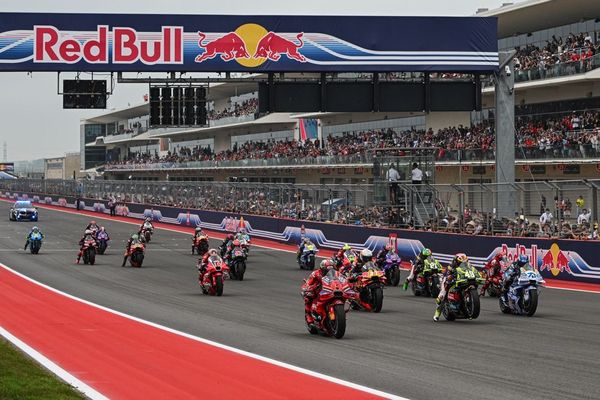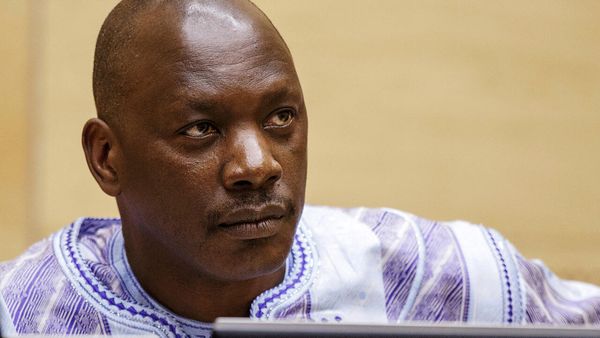
Donald Trump is losing patience with Vladimir Putin’s stalling tactics over the Ukraine ceasefire, the Finnish president, Alexander Stubb, said after spending several hours with the US president – including winning a golf competition with him at his Mar-a-Lago resort in Florida on Saturday.
Stubb, who also spent two days with the Ukrainian president, Volodymyr Zelenskyy, last week in Helsinki suggested in a Guardian interview a plan for a deadline of 20 April, by which time Putin should be required to comply with a full ceasefire.
Stubb pointed out that a third golf partner on Saturday, the Republican senator Lindsey Graham, already has a bill in the US Senate proposing what he has described as “bone-breaking” US sanctions on Russia if it did not accept an unconditional ceasefire.
The round of golf diplomacy seemed to make a positive impression on Trump, who wrote afterwards on his Truth Social platform: “I just played a round of Golf with Alexander Stubb, President of Finland. He is a very good player, and we won the Men’s Member-Guest Golf Tournament at Trump International Golf Club in Palm Beach County …
“President Stubb and I look forward to strengthening the partnership between the United States and Finland, and that includes the purchase and development of a large number of badly needed Icebreakers for the U.S., delivering Peace and International Security for our Countries, and the World.”
Asked how he thought Trump would express his impatience with Putin, Stubb said things would be clear in a matter of days. “When you spend seven hours with someone, you at least get an intuition of the direction in which we’re going,” he said.
Stubb – in London to see the UK prime minister, Keir Starmer – has emerged as a critical figure in the Ukraine talks process, and, like Starmer, said engagement rather than disengagement with Trump was the best way to persuade America not to abandon Ukraine.
Looking sprightly after his overnight flight to London, the Finnish president said: “I think we’re probably moving into the direction where the Americans are seeing Russia for what it’s worth. In other words, the overall ceasefire has been agreed by the United States, by Ukraine and by Europe, but not by Russia.
“The half-ceasefire has been broken by Russia, and I think America, and my sense is also the president of the United States, is running out of patience with Russia. I think that’s good news for engagement and negotiation. So this is what I sensed over the weekend as well.”
He explained: “My message in the conversations I have with the [US] president is that we need a ceasefire, and we need a deadline for the ceasefire, and then we need to pay a price for breaking a ceasefire. So number one, we need a ceasefire date, and I would prefer that to be Easter, say, 20 April, when President Trump has been in office for three months. If by then it’s not accepted or is broken by Russia, there needs to be consequences. And those consequences should be sanctions, maximum sanctions, and we continue the pressure up until the 20th and then we’ll see what happens.”
He added: “I think it would be quite a useful combination at this moment to get a deadline from the president of the United States with a sanctions package coming from the Senate.”
Stubb said it was not for him to give the US advice on the kind of sanctions it could impose, but Trump said on Sunday, after meeting Stubb, that he was considering secondary sanctions on any country that bought Russian oil.
Stubb said: “We in Finland understand not to trust Putin. Don’t underestimate his capacity to delay. But we need to call his bluff. It’s typically Russian to say, ‘yes, Mr President, there’s a ceasefire’. And after that, say, ‘but the conditions are …’ That’s not the way in which I think we should negotiate with the Russians. The only thing they understand is power.”
The Finnish president stressed it would be wrong for Europe to loosen its own sanctions now, as demanded by Putin as the price for a Black Sea peace deal, saying any European sanctions relaxation should be strictly conditions-based.
He remains a good deal more sceptical than Trump’s special envoy Steve Witkoff about Putin’s bona fides. Witkoff had said it was preposterous to think Russia would want to seize further European land if it was given the four main Ukrainian regions it currently party occupies.
For all the golf diplomacy, Stubb has no compunction in criticising Witkoff, who seemed in a recent interview with Tucker Carlson to regard the referendums held in Russian-held regions and Crimea as a legitimate expression of their wish to be annexed by Russia.
Stubb said: “Anyone who says that a referendum that has been conducted in the Crimean peninsula is somehow valid doesn’t know what international relations means. We fundamentally disagree with that approach. I personally will never, ever recognise any territorial acquisition by Russia to Ukraine.”
Stubb has been pressing his fellow leaders to be more specific about what they are seeking to achieve. “A ceasefire is about monitoring the line of contact and can entail some kind of coalition of the willing in the air, sea, and then also in land,” he said.
“But a completely different story is the actual peace agreement. That’s when you get into traditional peacekeeping, which is usually UN mandated, and so on and so forth.”
He explained: “What we are saying in Finland, from the northern flank, having the 1340-kilometre (830-mile) border of Europe with Russia, is that that border actually starts from northern Norway and covers all the way, and if you count Belarus as part of it, that’s 5000 kilometres (3107 miles). So that’s the border that we need to protect.
“That’s why we are not probably going to provide troops in the ceasefire stage, but we can definitely do something when the peace agreement is there, if there’s an international mandate.”
Either way, Stubb suggests like Starmer, there would have to be some kind of US involvement – something Trump has not yet offered. But, Stubb said: “I don’t exclude that some of the monitoring is done by Americans and American technology, because it’s non-military activity. So, there’s so many ways in which you can do this.”
Like Graham, Stubb is interested in protecting Ukraine’s sovereignty in any peace agreement not by offering Nato membership, but instead through a clear political statement as part of the agreement that Ukraine would be given automatic Nato membership if Russia breached the ceasefire.
The Italian prime minister, Giorgia Meloni, at the weekend proposed a variation by which Ukraine would not be offered Nato membership but instead the protection of Nato’s article 5 security guarantee. Stubb said her ideas would be studied closely, but hinted at scepticism, saying article 5 was the essence of Nato. “We think that the core of this war is about the triangular existence of a nation state, which is independence, sovereignty and territorial integrity,” he said.
He recalled how Finland lost its sovereignty after the winter war and the war of continuation. “In other words, world war two, we weren’t able to decide the clubs where we wanted to participate. We also lost 10% of our territory, including the areas where my grandparents, my father, were born.”
Stubb, who clearly sees Ukraine as an entry-point for a wider, more formal pact with the UK on security, said: “One of the things that I’m particularly pleased about in this tragic war is that we are now seeing a Britain engaged again in Europe. And before coming here, had I had enough time, I would have written a column in the Guardian saying ‘Britain is back’.
“We are now seeing British and French leadership in brokering the European position, not only here in London, but also in Paris, and in the way in which prime minister Starmer is conducting the discussions his national security team, led by Jonathan Powell. This is a great opportunity for Britain to engage with Europe again and vice versa. So if this could be now the embryo of a new British-EU relationship, I would warmly welcome that.”
Despite his multilingual, academic pro-European background, Stubb is in some ways an ideal conciliator with Trump since he spent three years at university in the US and was at one point considered good enough for the Finnish national golf team –something he modestly admitted was equivalent to being selected for the English ice-hockey team.
“I did play [golf] seriously. And I played at the British amateur Open at Litchfield sometime in the 1980s. I missed the cut by one,” he ruefully recalled, “and then I went to study in the US with the dream of becoming a professional. But I basically quit after three months and got serious about studying.”
Stubb said tactfully he would not analyse Trump’s golf game for hints of his personality, but said he was “very impressive, and I’m not only speaking because of his age, but he hit the ball very well. It was quite fun in the sense that we were on the same team, so we were playing best ball … we were alternating giving an impact for our teams.”
Stubb said of their game: “It’s a good, good, good, good way of spending the better part of seven hours together with the president. So we had breakfast, and then we had a go round the course, and then we had lunch, and we had sitting with Lindsey Graham there, and then we had legendary Gary Player, the South African grand slam winner, at the tender age of 89. It is a good way to get to know one another.”
Golf diplomacy has been seen as the entry ticket to Trump’s heart since the former Japanese prime minister Shinzo Abe successfully courted him in his first term by playing endless rounds. Stubb said it was feasible in golf to mix pleasure with business, so to discuss Russia’s trustworthiness “between shots”.
“Anyway, for sure I prefer a golf course to meeting rooms,” he said.







